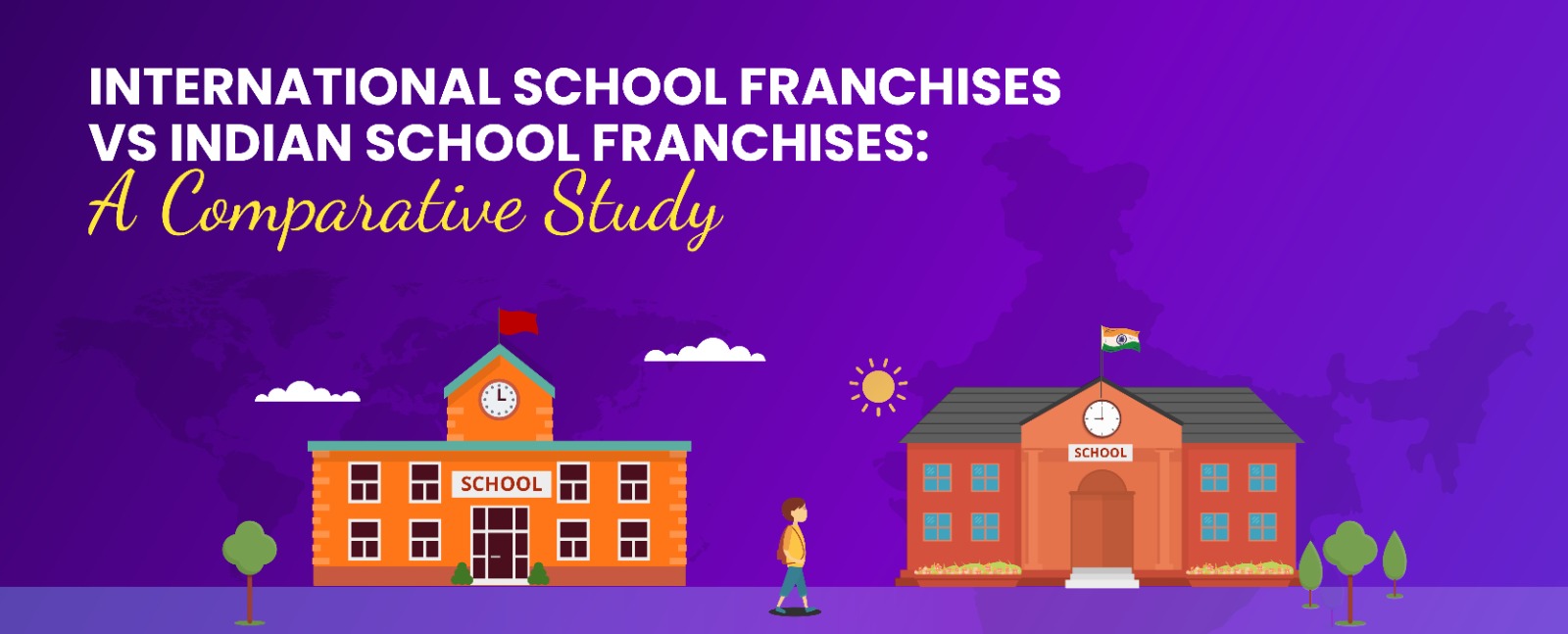The Indian education industry is developing at a high pace since international school franchises and Indian school franchises are providing quality education. While the two models are functioning with an objective of providing the best education, the models are varied as far as the curriculum, mode of instruction, regulatory standards, and performance of the students are concerned. In educated decisions, would-be school franchisees must realize these differences. Let us dig out where international and Indian school franchises are different on key parameters.
Enquiry Form
1. Curriculum Frameworks
The difference between international and Indian school franchises lies in which the curriculum adopted is of major concern.
- International School Franchises: They employ globally recognized curriculum such as the American Common Core standards, Cambridge International (IGCSE), or International Baccalaureate (IB). The curriculum of such schools lays stress on international awareness, inquiry-learning, and analytical thinking.
- Indian School Franchises: Follow state and national curricula, such as those established by state boards, the Central Board of Secondary Education (CBSE), and the Indian Certificate of Secondary Education (ICSE). They adhere to a more challenging, exam-oriented system with syllabi aligning with national educational policy.
2. Teaching Methodologies
International school franchises have very disparate teaching methodologies compared to the Indian school franchises.
- International Schools: Foster experiential learning, problem-solving, and inter-disciplinary learning. Enable their teachers to foster independent thinking through interactive methods like project-based learning, group discussions, and research work.
- Indian Schools: Have a more traditional, syllabus-based system, with a leaning towards rote learning and competitive exams. Most contemporary Indian school chains, however, such as Podar Smarter School, are adopting new-age pedagogies to increase learner engagement.
3. Regulatory Frameworks
School franchise management and control needs differ in the two models.
- International Schools: Should be in compliance with international accrediting bodies such as IB, Cambridge Assessment International Education (CAIE), or AdvancED. They should be in compliance with the host country’s education policy.
- Indian Schools: Should follow norms framed by National Education Policy (NEP), CBSE, ICSE, or state boards as the case may be. Government approval, affiliation conditions, and quality criteria of teachers are important from the operational perspective.
4. Career Opportunities and Students’ Performance
Career opportunities and students’ performance will be based on the category of the franchise.
- International School Graduates: Have a broader opportunity for international careers and higher education in the US, UK, and Australia since they are trained to university level within these nations. International schools also focus on developing skills, leadership, and intercultural understanding.
- Indian School Graduates: Perform better in competitive exams like JEE, NEET, and UPSC that are critical for admissions into higher studies as well as selection into the Indian government. Well-established foundation in core subjects equips them to undertake a wide range of academic as well as professional courses.
5. Cost and Accessibility
The cost and affordability of this chain of schools differ enormously.
- International School Franchises: Generally have a niche clientele, with high foreign teacher salaries, international-standard infrastructure, and international networks.
- Indian School Franchises: Made available to the masses at economic prices, with quality education at relatively economic prices. Most of them also offer scholarships and government reservations to be inclusive.
Conclusion
Both Indian and international school franchises are strong individually. Foreign franchises have international reach and modern approaches to learning coupled with a globally acceptable curriculum, and Indian franchises have structured learning all over the country. Podar Smarter School fills the void because it has the best of both with a structured but future-based strategy towards learning. It is an educational solution based on educational motives, cost, and ultimate professional goals.

